Diplomatic Bluebook 2016
Chapter 1
International Situation and Japan’s Diplomacy in 2015
2.Japan’s diplomacy
The year 2015 marked the 70th anniversary of the end of World War Ⅱ, and was a year to reflect on the path of the post-war Japan. Their Majesties the Emperor and Empress visited the Republic of Palau in April to mourn and pay tribute to those who died in the war and pray for peace. Furthermore, Their Majesties the Emperor and Empress visited the Philippines for advancement of friendly relationship in January 2016 on the occasion of the 60th anniversary of the normalization of the diplomatic relations between the two countries. Also in the Philippines Their Majesties the Emperor and Empress paid tribute to those who died in the war and prayed for peace.
The Prime Minister, in his statement delivered in August 2015, looked back on the road to the war, post-war developments and the era of the 20th century, and sent to the world a message indicating how Japan should be created heading toward the 80th, the 90th and the centennial anniversary of the end of the war, with the lessons learnt engraved in the hearts of the Japanese people.
Japan, while making the utmost efforts for promotion of national interests in the increasingly severe international situation, will contribute to peace and prosperity of the international community and further advance post-war developments as a peace-loving nation.
(1) Diplomacy taking a panoramic perspective of the world map and “Proactive Contribution to Peace”
In order to create a stable and predictable international environment, which is desirable for Japan, it is important to build trust and cooperative relationships with countries worldwide and the international community by means of diplomatic efforts, to strengthen the basis for stability and prosperity of the international community and to prevent the emergence of threats in advance.
From such perspective, since the inauguration of the Abe administration, the Goverment of Japan has been deploying diplomacy which contributes to ensuring the peace, stability and prosperity of the international community, from a panoramic perspective of the world map, under the policy of “Proactive Contribution to Peace” based on the principle of international cooperation.
Prime Minister Shinzo Abe visited 63 countries and regions (86 countries and regions in total) so far, and conducted nearly 400 summit meetings. Foreign Minister Fumio Kishida visited 42 countries and regions (65 countries and regions in total), and conducted 604 meetings with foreign dignitaries (including 247 meetings with foreign ministers from 104 countries) (as of February 20, 2016). As a result, Japan’s presence in the international community has steadily risen and personal trust between Prime Minister Abe and foreign leaders as well as between Foreign Minister Kishida and other foreign ministers have greatly been deepened.
In addition, Japan’s continued efforts to address global issues such as disarmament and non-proliferation, peacebuilding, economic development, disaster risk reduction, climate change, human rights, women’s empowerment and establishment of rule of law, constitute an important part of the “Proactive Contribution to Peace.” Japan’s diplomatic efforts and results are highly supported and appreciated by the international community.
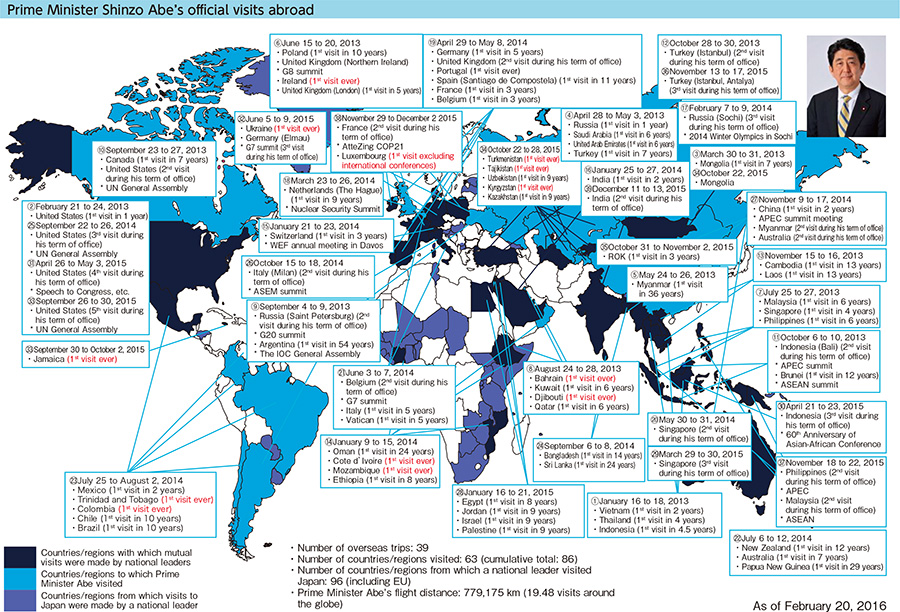
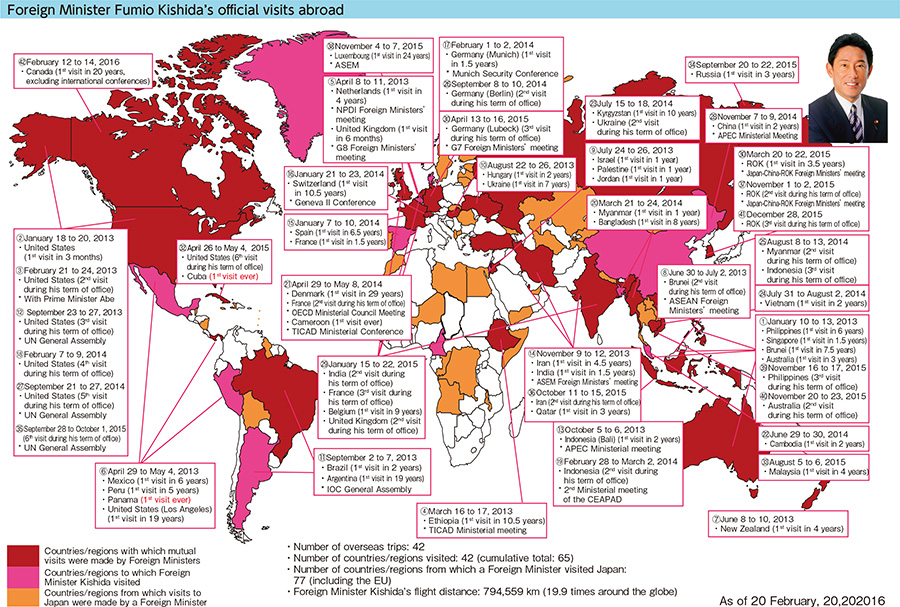
In the current situation where the world is interconnected by globalization and technological innovation and threat to the security environment is becoming diverse and complex, no nation can maintain its own peace and security alone. International community expects Japan to play a proactive role for the peace and stability of the international community. The “Legislation for Peace and Security” which was approved by the Diet in September 2015, allows “seamless response” to any situation to protect the people’s lives and peaceful livelihood and also enables Japan to further contribute to the peace and stability of the international community.
(2) The Three Pillars of Japan’s Foreign Policy
In order to protect and promote Japan’s national interests, Japan intends to continuously work on the following three pillars of Japan’s foreign policy: ① strengthening the Japan-U.S. Alliance, ② enhancing relations with neighboring countries, and ③ strengthening economic diplomacy as a means of driving the growth of the Japanese economy.
【Strengthening of the Japan-U.S. Alliance】
The Japan-US Alliance is the linchpin of Japan’s diplomacy. In cooperation with the U.S. which takes rebalance policy toward the Asia Pacific region, Japan will continue to further strengthen the Japan-U.S. Alliance in all areas.
Currently, the Japan-U.S. Alliance is more robust than ever before. When Prime Minister Abe visited the U.S. in April, the two leaders confirmed that they would continue to fulfill a leading role in ensuring peace and stability of the region and the world. Prime Minister Abe also delivered an address entitled “Toward an Alliance of Hope” to a Joint Meeting of the U.S. Congress. At the summit meeting held during the Asia Pacific Economic Cooperation (APEC) in November, it was agreed to build a network to realize peace and prosperity in the region, with the Japan-U.S. Alliance as the linchpin.
In April, the Japan-U.S. Security Consultative Committee (“2+2”) was held, and the new Guidelines for Japan-U.S. Defense Cooperation (the New Guidelines) were announced. Together with the “Legislation for Peace and Security,” the New Guidelines further enhance the deterrence and response capabilities of the Japan-U.S. Alliance, thereby expanding and strengthening cooperation in a wide range of areas, including efforts under the New Guidelines.
Mitigation of the impact on Okinawa is an issue that the government makes utmost efforts to address. Japan will work toward Marine Corps Air Station (MCAS) Futenma’s earliest possible relocation to Henoko in order to eliminate its danger while maintaining the deterrence of U.S. forces.
【Enhancing relations with neighboring countries】
In terms of making the environment surrounding Japan stable, enhancing our relations with neighboring countries constitutes an important basis. The Japan-China-ROK Trilateral Summit was held in November in the ROK for the first time in almost three and a half years. The three leaders reaffirmed that trilateral cooperation has been completely restored and reaffirmed that the Trilateral Summit is to held on a regular basis.
The relations with China constitute one of Japan’s most important bilateral relationships.
The two countries share the responsibility for the peace and stability of the region and the international community. Following a series of summit meetings and foreign ministers’ meetings held in the previous year, the Japan-China relations are improving as a whole. Japan will continue to engage in dialogue and cooperation in various areas and endeavor to further promote the “Mutually Beneficial Relationship based on Common Strategic Interests”. Meanwhile, given that the situation in the East China Sea is deteriorating, Japan continues to respond in a firm but calm manner while making claims that should be made in dealing with China’s intrusions into Japan’s territorial waters around the Senkaku Islands and its unilateral resource development in areas pending delimitation.
The ROK is Japan’s most important neighbor that shares strategic interests. On the occasion of the Japan-China-ROK Trilateral Summit in November, the Japan-ROK summit meeting was held for the first time since the inauguration of the 2nd Abe administration, followed by a Japan-ROK Foreign Ministers’ meeting in late December, where the foreign ministers confirmed that the issue of comfort women is resolved finally and irreversibly (see P38 “Announcement by Foreign Ministers of Japan and the Republic of Korea at the Joint Press Occasion”). Furthermore, Prime Minister Abe and President Park confirmed that they would take responsibility as leaders to implement this agreement, and deal with various issues based on the spirit of this agreement. In light of this agreement, the Government of Japan will move toward developing a new era of future-oriented Japan-ROK relations.
Also, in light of the increasingly severe security environment, it is essential to deepen cooperative relations with partners sharing such values as freedom and democracy in the Asia-Pacific region. Japan and Australia, sharing common values and strategic interests, enjoy a “special relationship.” Japan continues to both expand and deepen cooperation with the newly inaugurated Turnbull administration, confirming this “solid strategic partnership.” With regard to India, Japan enjoys the relationship “blessed with the largest potential for development of any bilateral relationship anywhere in the world. The “beginning of a new era in Japan-India relations” was confirmed at the summit meeting between Prime Minister Abe and Prime Minister Modi during Prime Minister Abe’s visit to India in December.
Cooperative relations between Japan and member states of the Association of Southeast Asian Nations (ASEAN) are being further enhanced in broad fields through mutual VIP visits including by leaders and summit meetings between Japan and the ASEAN.
Promoting political dialogue with Russia, Japan held Summit Meetings with Russia twice in 2015. Furthermore, with regard to the Northern Territories Issue, which is the greatest concern between Japan and Russia, Foreign Minister Kishida’s visit to Russia in September marked the resumption of negotiations for the conclusion of a peace treaty. Toward the conclusion of a peace treaty with Russia through the resolution of the issue of the attribution of the Four Northern Islands, Japan will redouble its efforts on negotiations and proactively engage in political dialogue with Russia through various occasions. Moreover, toward a peaceful resolution to the situation in Ukraine, Japan will play an active role as the President of the Group of Seven (G7), while valuing solidarity with the G7.
Concerning North Korea, we strongly condemn the nuclear test in January 2016 and a spate of launches of ballistic missile by North Korea. Under its policy of “dialogue and pressure” and “action for action” and in accordance with the Japan-DPRK Pyongyang Declaration, Japan will continue to work toward the comprehensive resolution of the outstanding issues of concern, such as the abductions, nuclear and missile issues. As being a critical issue concerning the sovereignty of Japan and the lives and safety of Japanese citizens, abduction by North Korea constitutes a universal issue among the international community as a violation of fundamental human rights. Regarding its resolution as one of its most important foreign policy issues, Japan will make its utmost efforts towards the resolution of the abductions issue as one of the most important foreign policy issues in cooperation with the international community.
【Promoting economic diplomacy as a means of driving the growth of the Japanese economy】
The promotion of economic diplomacy to drive the growth of the Japanese economy is one of the priority policies of Japan. For Japan, a maritime nation with scarce resources, it is critically important to maintain and develop an open and stable international economic order based on rules. To regain a strong Japan and revitalize its economy, Japan takes advantage of various international frameworks concerning the economy, such as the G7, Group of Twenty (G20), and World Trade Organization (WTO), Organization for Economic Cooperation and Development (OECD) and APEC, to contribute to forming the international economic order.
An agreement in principle was reached in October 2015 on the Trans-Pacific Partnership (TPP) Agreement, which creates a huge “single economic zone” involving a population of about 800 million and accounting for almost 40% of the world’s GDP. It was signed in February 2016. The TPP Agreement, which establishes 21st century rules in a wide range of fields, including not only customs duties on goods, but also services, investment, intellectual property and state-owned enterprises, is expected to provide a new standard for trade and investment rules of the world. It is also worth noting that Japanese businesses, including small and medium-sized ones, would be connected with and thereby expand their field to the markets across the Asia Pacific region, which is the center of global growth. Furthermore, there was also progress in bilateral Economic Partnership Agreements (EPAs) in 2015, such as the entry into force of the Japan-Australia EPA and the signing of the Japan-Mongolia EPA. In this way, the foundation of incorporating the vitality of overseas markets leading to the growth of the Japanese economy has been being steadily built.
In order to tap into the growth of other countries, including emerging economies, through Japanese companies’ overseas activities, the public and private sectors need to work together. Thus Prime Minister Abe and Foreign Minister Kishida have taken the initiative to proactively perform top-level sales. Division for Promotion of Public-Private Partnership was set up in MOFA in September to comprehensively promote public-private cooperative business operations. Japan will continue to promote the exports of infrastructure systems under the cooperation of the public and private sectors. In particular, infrastructure investment is to be promoted mainly in Asia through “The Partnership for Quality Infrastructure” aimed at developing infrastructure which is easy to use and durable as well as environmentally friendly and disaster resilient.
(3) Response to Global Issues
The year 2015 marked the 70th anniversary of the end of World War Ⅱ. The year 2015 also marked 70 years since the foundation of the United Nations (UN) and the atomic bombings. In October, Japan was elected as a non-permanent member of the UN Security Council for a record-high 11th time among the UN member states. The year 2016 marks the 60th anniversary of Japan’s accession to the UN. Through this opportunity, Japan will strengthen cooperation with the UN to continue to take lead in discussions on global peace and stability as a practice of “Proactive Contribution to Peace.” Furthermore, Japan will make efforts to promote Security Council reform, the essential component of the comprehensive reform of the UN, with a view to ensuring that the UN can better reflect the realities of the international community and address issues more effectively.
【Contribution to realizing a human centered society】
In order to take care of socially vulnerable people in the international community and realize a society where individuals can make the most use of their potential, Japan has been advancing international contributions under the notion of “human security.”
〈Toward a society where women shine〉
The realization of a “society where women shine” is a top priority issue of the Abe administration. The second World Assembly for Women (“WAW!”) was held in August to achieve “society where all women shine.”
〈Children, persons with disabilities and the elderly〉
Human rights and fundamental freedom are universal values, and socially vulnerable people in particular must enjoy their sufficient benefit. Children’s rights are discussed at the 3rd Committee of the UN General Assembly and the UN Human Rights Council, where Japan actively leads the discussion. Japan became a party to the “Convention on the Rights of Persons with Disabilities” in 2014 and, as part of developing the corresponding domestic legislations, the enforcement of the “Act for Eliminating Discrimination against Persons with Disabilities” is scheduled for April 2016. Furthermore, having entered a super-aging society, Japan will continue to share with the world a wealth of knowledge accumulated about its own aging society.
〈Global Health〉
In “human security” where individuals are to be protected and their potential is to be fully developed, health occupies an important place. For Japan to play a major role in resolving global issues including those of health issues, based on the notion of “human security,” is nothing but the practice of “Proactive Contribution to Peace.” Given that building of a resilient and sustainable health system provides the basis of economic and social development and leads to the stability of the international community, Japan, making use of official development assistance (ODA), promotes universal health coverage (UHC), wherein all people in the world can receive fundamental health and medical services. Japan also makes contributions toward strengthening the international capability to respond to public health crises caused by infectious disease.
〈2030 Agenda for Sustainable Development〉
At the UN summit held in September, the “2030 Agenda for Sustainable Development” was adopted. Japan contributed proactively to its formulation. In the Agenda, a set of Sustainable Development Goals (SDGs) are listed including the goals in such areas as health which were not fully achieved in the Millennium Development Goals (MDGs), as well as new goals related to environment and inequalities. All countries are expected to work on the implementation of the SDGs. Japan will steadily implement the Agenda through working on the issues of health care and education as well as the mainstreaming of gender and disaster risk reduction, based on the notion of “human security.”
【Contribution to prosperity】
〈New Development Cooperation Charter〉
In February, in light of the changing environment surrounding official development assistance (ODA) in the international community, the “Development Cooperation Charter” was approved by the Cabinet. Japan will continue to actively contribute to a variety of development challenges based on three basic policies: ① Contribution to peace and prosperity through cooperation for non-military purposes; ② Promoting of “human security”; and ③ Cooperation aimed at self-reliant development through assistance for self-help efforts as well as through dialogue and collaboration based on Japan’s experience and expertise.
〈Climate Change〉
In order to reduce emissions of greenhouse gases on a global scale, the Paris Agreement, an agreement on a fair and effective international framework applicable to all Parties for the first time in history, was adopted at the 21st session of the Conference of the Parties (COP21) to the UN Framework Convention on Climate Change in December. Japan contributed proactively to its adoption. Japan will contribute to making this historic agreement lead to worldwide actions against climate change.
〈Disaster risk reduction〉
Disaster risk reduction is an area where Japan can take advantage of its strengths, based on its past experiences accumulated through many disasters. Japan hosted in March the Third UN World Conference on Disaster Risk Reduction in Sendai City, and promoted the “mainstreaming of disaster risk reduction,” namely incorporating disaster risk reduction in policies of participating countries.
〈Utilizing science and technology for diplomacy〉
In order to promote science and technology diplomacy utilizing Japan’s superior science and technology in various aspects of diplomacy such as security, global issues and international cooperation, the Science and Technology Adviser to the Minister for Foreign Affairs was appointed in September.
【Contribution to peace】
〈Proactive initiatives for disarmament and non-proliferation〉
As the only country to have ever suffered atomic bombings and as a responsible member of the international community, Japan has led the international efforts for realizing a world free of nuclear weapons. In order to maintain and strengthen the regime of the Treaty on the Non-Proliferation of Nuclear Weapons (NPT), which constitutes the foundation of the current international nuclear disarmament and non-proliferation regime, Japan led the discussions at the 2015 NPT Review Conference held in the 70th year since the atomic bombings.
〈Promotion of international peace cooperation〉
Japan has dispatched more than 10,000 personnel to a total of 13 United Nations Peacekeeping Operations (UN PKO) so far, taking into account the importance of cooperation in UN PKO from the standpoint of “Proactive Contribution to Peace” based on the principle of international cooperation. Japan’s contribution in the area of international peace cooperation have received significant appreciation both domestically and internationally. Four staff officers (as of February 2016) have been dispatched since 2011, and engineering units (353 personnel as of February 2016) since 2012, to the UN Mission in the Republic of South Sudan (UNMISS).
〈Measures against terrorism and violent extremism and for support refugee〉
The international community was forced to respond to serious terrorism and its underlying violent extremism in 2015. The fight against terrorism and violent extremism was also referred to in the Leaders’ Declaration at the G7 Ellmau Summit (in Germany). Japan in February expressed financial support for counter-terrorism capacity building in the Middle East and Africa, amounting to 15.5 million US dollars. In December, a “Unit of International Terrorism Information Collection” was established in MOFA to ensure the safety of Japanese people in and outside of the country.
With respect to the issue of a large number of refugees caused by the protracted Syria crisis, Prime Minister Abe announced at the UN General Assembly in September that Japan would provide assistance of 810 million US dollars to support Syrian and Iraqi refugees and IDPs and about 2.5 million US dollars to implement humanitarian aid to neighboring countries of the EU. In addition, Japan announced additional financial support of about 2.7 million US dollars to countries neighboring the EU in November. Furthermore, at the Supporting Syria and the Region conference in London in February 2016, Japan announced financial support of about 350 million US dollars to Syria and Iraq as well as their neighboring countries facing refugees and IDPs.
〈Proactive efforts to strengthen the rule of law〉
In dealing with all of unilateral actions seen in the South China Sea to change the status quo and increase tensions such as large-scale and rapid land reclamation, building of outposts and their use for military purposes, Japan has been working to maintain and promote open sea in cooperation with the countries concerned, while utilizing ODA and other means based on the “Three Principles of the Rule of Law at Sea.”
Japan will also work on efforts for ensuring the security of sea lanes through anti-piracy measures off the coast of Somalia and in the Gulf of Aden as well as in Asia, for establishing and strengthening the “rule of law” in outer space and cyber space, as well as for addressing new opportunities and challenges in the Arctic.
(4) Strengthening strategic communication and the foreign policy implementation structure
【Strategic Communications】
In 2015, Japan communicated that it continues to follow the path of a peace-loving nation and contributes to the peace and development of the Asia Pacific region and the world. In 2016, there are many valuable opportunities available for Japan to lead discussions in the international community, such as the G7 Ise Shima Summit to be hosted by Japan. While taking full advantage of these opportunities, Japan will enhance its strategic communication, communicating Japan’s views in a strong manner, cultivating understanding and support for Japan through sharing Japan’s rich and varied appeal.
【Enhancing the foreign policy implementation structure】
MOFA continues its efforts to enhance its comprehensive foreign policy implementation structure. MOFA will make efforts to achieve a further reform of the diplomatic missions overseas and personnel structure in order to ensure a level of foreign policy implementation structure that is comparable to those of other major countries.
Their Majesties the Emperor and Empress visited the Republic of Palau from April 8 to April 9, 2015, on the occasion of the 70th anniversary of the end of the war, to pray for the war dead as well as promote friendly relationship between Japan and the Republic of Palau. The memorial events at the West Pacific ocean Monument to the War Dead and at the U.S. Army 81st Infantry Division Memorial in Peleliu Island took place with the participation of the presidents and their spouses of the three Micronesian countries, the Republic of Palau, the Federal States of Micronesia and the Republic of the Marshall Islands. Their Majesties the Emperor and Empress, remembering the war dead and praying to world peace, laid wreaths to the Monument and the Memorial. They also had an audience with the presidents of the Republic of Palau, the Federated States of Micronesia and the Republic of the Marshall Islands and their spouses. (For the details about the relations with the Pacific Islands including Palau, see 2-1-5(3))
Reminiscence of Their Majesties the Emperor and Empress’ visit to the Republic of Palau
Ambassador Extraordinary and Plenipotentiary of Japan to the Republic of Palau ●Kazuhiro Tajiri
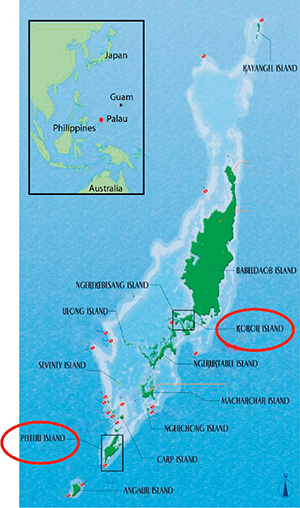
This visit was a historic event for Palau as well. In particular, President Tommy E. Remengesau Jr’s strong desire to make the visit of Their Majesties the Emperor and Empress successful spread from the whole Palau government to the people of Palau, and the leadership of the President was also felt even in the course of preparations for the visit. In addition, it was President Remengesau who came up with the idea of inviting President Mori and his spouse from the Federated States of Micronesia and President Loeak and his spouse from the Republic of the Marshall Islands to the Republic of Palau to welcome Their Majesties together. The idea is presumably attributed to his favorable consideration of Their Majesties as well as his careful attention given to the feelings of the leaders of the Federated States of Micronesia and the Republic of the Marshall Islands, who share a sense of mutual solidarity with President Remengesau.
Having been ruled by Japan for 30 years up until the end of World War II, in Palau, there remains an image of the Emperor of Japan in the pre-war period mainly among the elderly, and great interest was generated even before the visit. During the visit, Their Majesties the Emperor and Empress opened the car window to wave with a smile to a large number of people who gathered on the roadside to welcome them. Their Majesties also shook hands and exchanged words warmly with hundreds of citizens and public officials, including residents of Peleliu Island. This provided an opportunity for the people of Palau to come into direct contact with the personality of Their Majesties.
Their Majesties’ sincere remembrance and thoughtfulness shown to a large number of welcoming people and other people concerned enhanced the good image of Their Majesties and Japan, leading to further strengthening of friendship between Japan and the Republic of Palau, the Federated States of Micronesia, and the Republic of Marshall Islands.
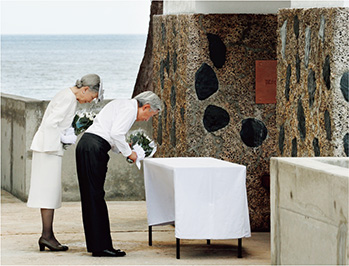 Their Majesties the Emperor and Empress laying wreaths to the “West Pacific ocean Monument to the War Dead” (April 9, Peleliu Island, Palau; Photo: Jiji)
Their Majesties the Emperor and Empress laying wreaths to the “West Pacific ocean Monument to the War Dead” (April 9, Peleliu Island, Palau; Photo: Jiji)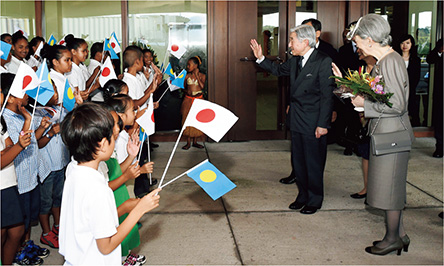 Their Majesties the Emperor and Empress waving to local children who greet Their Majesties after arriving at Palau International Airport (April 8, Palau; Photo: Jiji)
Their Majesties the Emperor and Empress waving to local children who greet Their Majesties after arriving at Palau International Airport (April 8, Palau; Photo: Jiji)In September 2015, the “Legislation for Peace and Security” was approved to enable Japan to respond seamlessly to any situations and to contribute even more to the peace and stability of the international community.
Through a variety of opportunities, the Government of Japan has been thoroughly explaining the “Legislation for Peace and Security” to the international community with transparency. As a result, Japan has gained understanding and support from many countries around the world, including Asian and Western countries. (see 3-1-1)

Main contents of the“Legislation for Peace and Security”
○Enhanced contribution to the peace and stability of the international community
1. International peace cooperation activities including United Nations (UN) Peacekeeping Operations (PKO)
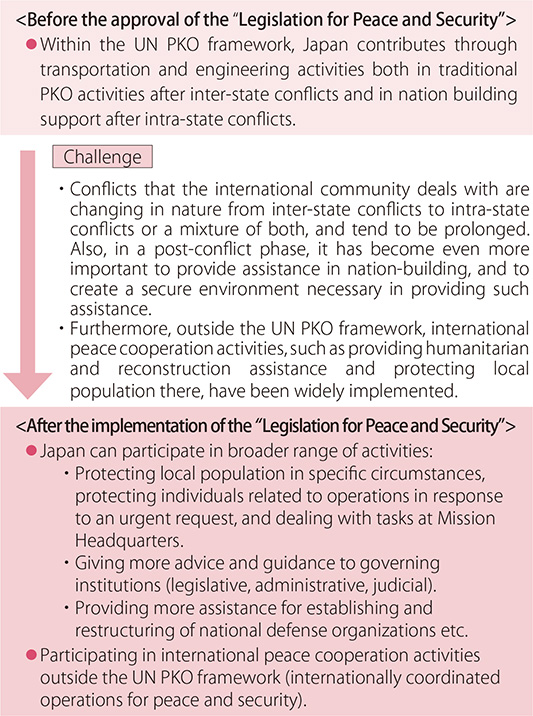
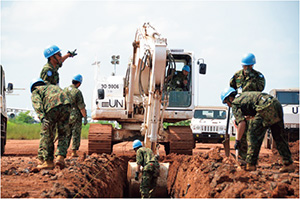 Self-Defense Force Engineering Unit engaging in an activity in the UN mission in the Republic of South Sudan
Self-Defense Force Engineering Unit engaging in an activity in the UN mission in the Republic of South Sudan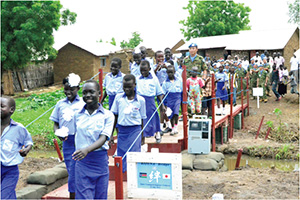 Crossover bridge constructed by the Self-Defense Force at an elementary school in the Republic of South Sudan
Crossover bridge constructed by the Self-Defense Force at an elementary school in the Republic of South Sudan2. Responses to situations that threaten peace and security of the international community
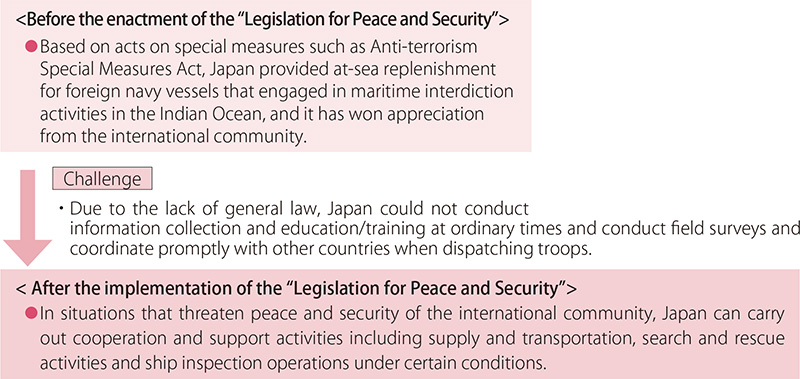
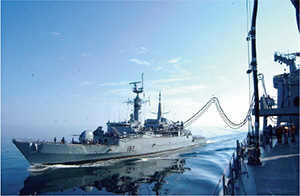 Replenishment vessel conducting underway replenishment
Replenishment vessel conducting underway replenishment○Seamless responses to any situations
3. “Use of force” as a measure of self-defense
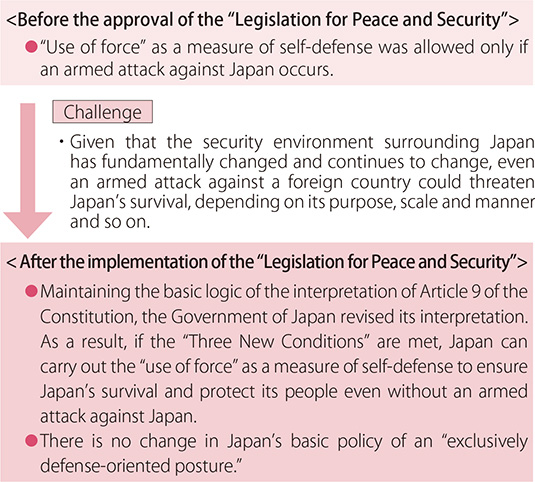
〈Three New Conditions〉
(1) When an armed attack against Japan occurs or when an armed attack against a foreign country that is in a close relationship with Japan occurs and as a result threatens Japan’s survival and poses a clear danger to fundamentally overturn people’s right to life, liberty and pursuit of happiness
(2) When there is no other appropriate means available to repel the attack and ensure Japan’s survival and protects its people
(3) Use of force should be limited to the minimum extent necessary
4. Response to situations that will have an important influence on Japan’s peace and security
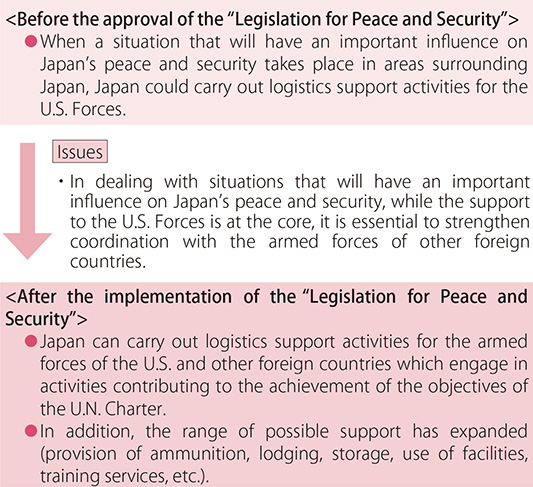
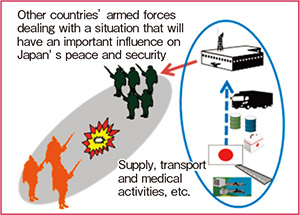 Logistics support activities
Logistics support activities5. Rescue of Japanese nationals overseas
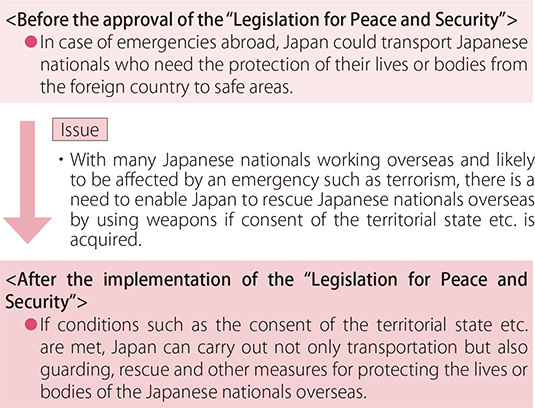
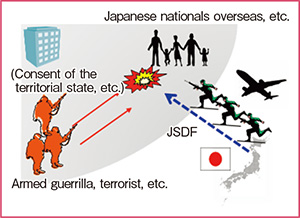 Rescue of Japanese nationals overseas
Rescue of Japanese nationals overseas〈Response to “Gray-zone” situations〉
Based on the cabinet decisions, procedures for ordering public security operations or maritime security operations are expedited, in cases of responding to a situation where an infringement that does not amount to an armed attack occurs in areas surrounding remote islands, etc., and police forces are not present nearby.


